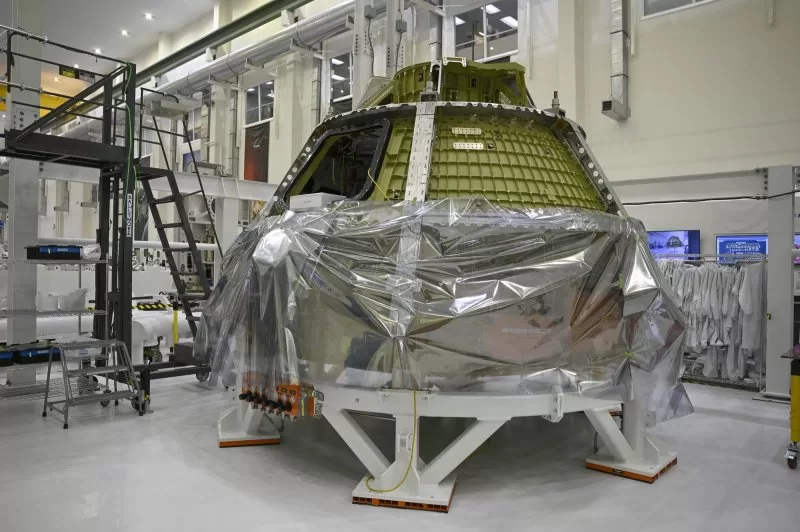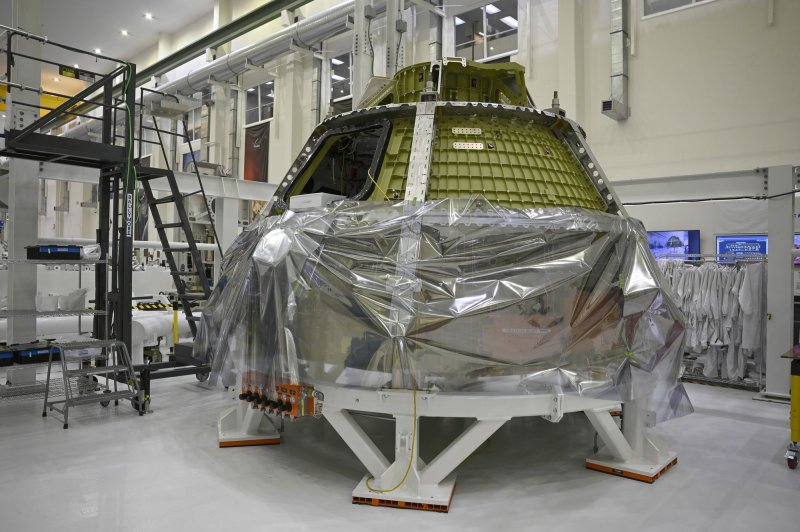Germany played a critical role in developing the propulsion modules for the Orion spacecraft, which will carry the first crewed mission in NASA’s Artemis Program in late 2024. File Photo by Joe Marino/UPI |
License PhotoJune 7 (UPI) — U.S. and German officials this week met in Berlin to discuss ongoing and future collaborations in space exploration and Earth science.
Leaders at the inaugural U.S.-Germany Space Dialogue highlighted a shared commitment to continue ongoing cooperation in space exploration and research, including through NASA’s Artemis campaign.
The Artemis campaign is a series of missions with the robust goal of returning to and establishing a long-term presence on the moon with the help of international partners.
Germany has played a critical role in developing the propulsion modules for Artemis’ Orion crew spacecraft, which will be used to carry astronauts from lunar orbit to the surface of the moon, according to a memo from the State Department.
The White House last December said the United States plans to land an international astronaut on the moon by 2030.
Earth-gravity study
The United States and Germany also highlighted an agreement between NASA and the German Aerospace Center (DLR) to continue gravity field measurements through the Gravity Recovery and Climate Experiment-Continuity, or GRACE-C mission.
The GRACE-C, which is projected to launch no earlier than 2028, involves a pair of satellites flying one behind the other in polar orbit to measure how Earth’s gravity changes from place to place due to shifting ice, water and land masses.
According to NASA, different mass distribution on the Earth’s surface — such as mass loss from melting ice sheets — leads to slight variations in gravitational pull, which researchers can track by measuring the change in travel distance between the two GRACE-C satellites.
Researchers hope the data from this mission will yield new insights into how climate change affects the water cycle.
The United States and Germany have been partnering on climate research since the launch of the first GRACE mission in 2002, and the GRACE-C mission is a continuation of that effort.
Representatives for both countries this week also shared information on respective national space policies, such as Germany’s Space Strategy and upcoming Space Security Strategy and the United States’ Space Priorities Framework.
Both sides expressed a desire to continue cooperation in areas such as addressing climate change, national security as it pertains to space, information sharing and commercial space cooperation.
Nuclear weapons, satellites in space
The United States and Germany shared their commitment to promote compliance with the Outer Space Treaty, which includes a prohibition on the placing of objects carrying nuclear weapons or any weapons of mass destruction in Earth’s orbit.
President Joe Biden has emphasized increased cooperation with allied countries, including Germany, on space activities and information sharing “for mutual benefit in response to growing space and counterspace threats and to protect U.S. forces from hostile uses of space.”
Both countries also discussed a range of programs that use satellites to help monitor weather patterns, support agriculture and infrastructure planning, respond to disasters and provide telecommunications services.
Sharing Landsat Next info
The two countries also expressed an intent to partner on NASA’s Landsat Next Mission, which will provide the most up-to-date observational data of changes to the Earth’s surface.
Landsat Next will be able to capture fast-changing processes such as crop growth, floods and algae blooms. The United States and Germany hope to share this data to support economic development, environmental management and to combat climate change on a global scale.
More than two-dozen private American and German space companies also were part of a discussion to highlight existing public-private partnerships in their respective countries and explore more opportunities for cooperation in the commercial space sector.
The next U.S.-Germany Space Dialogue will be held in the United States at a yet-to-be-determined date, according to the State Department.

